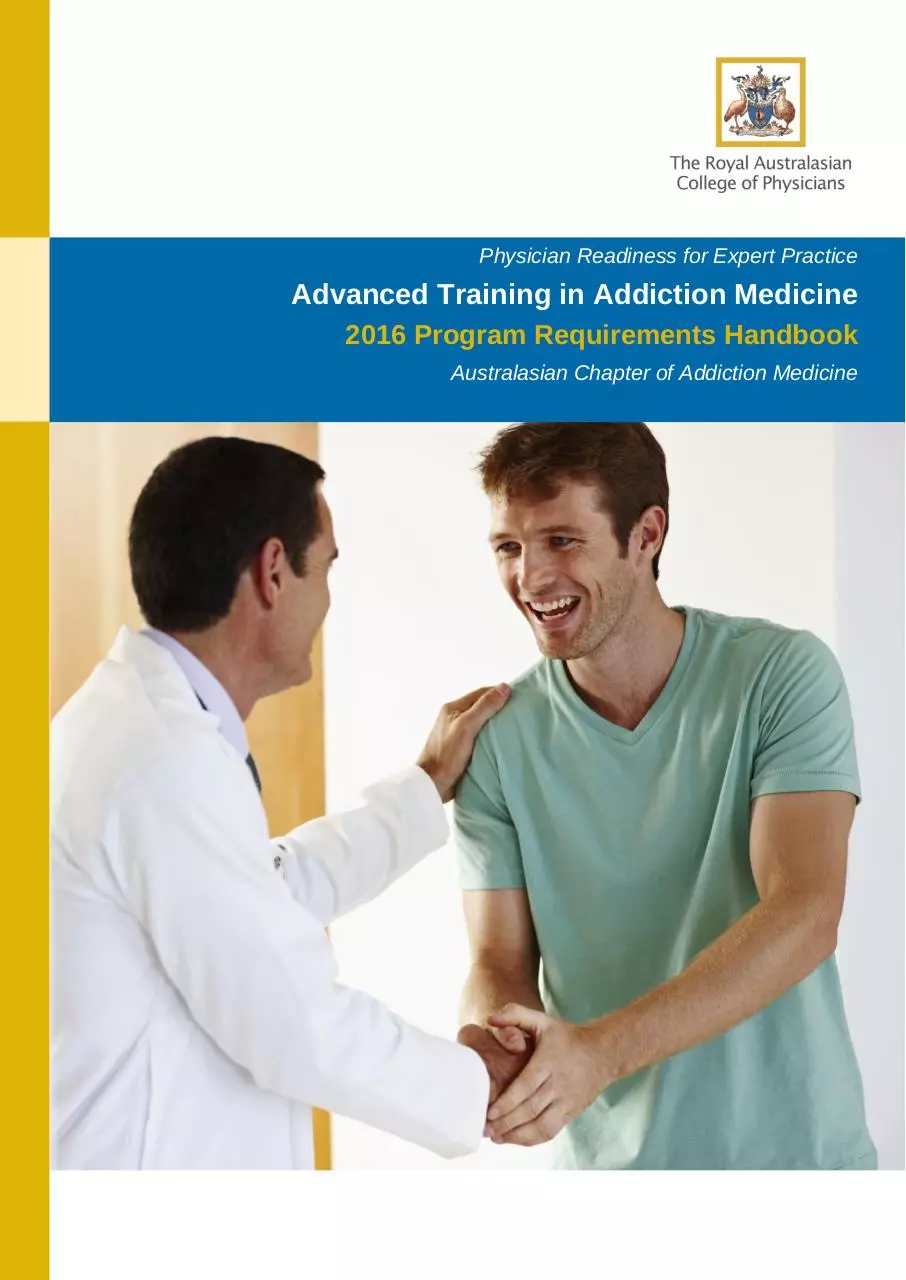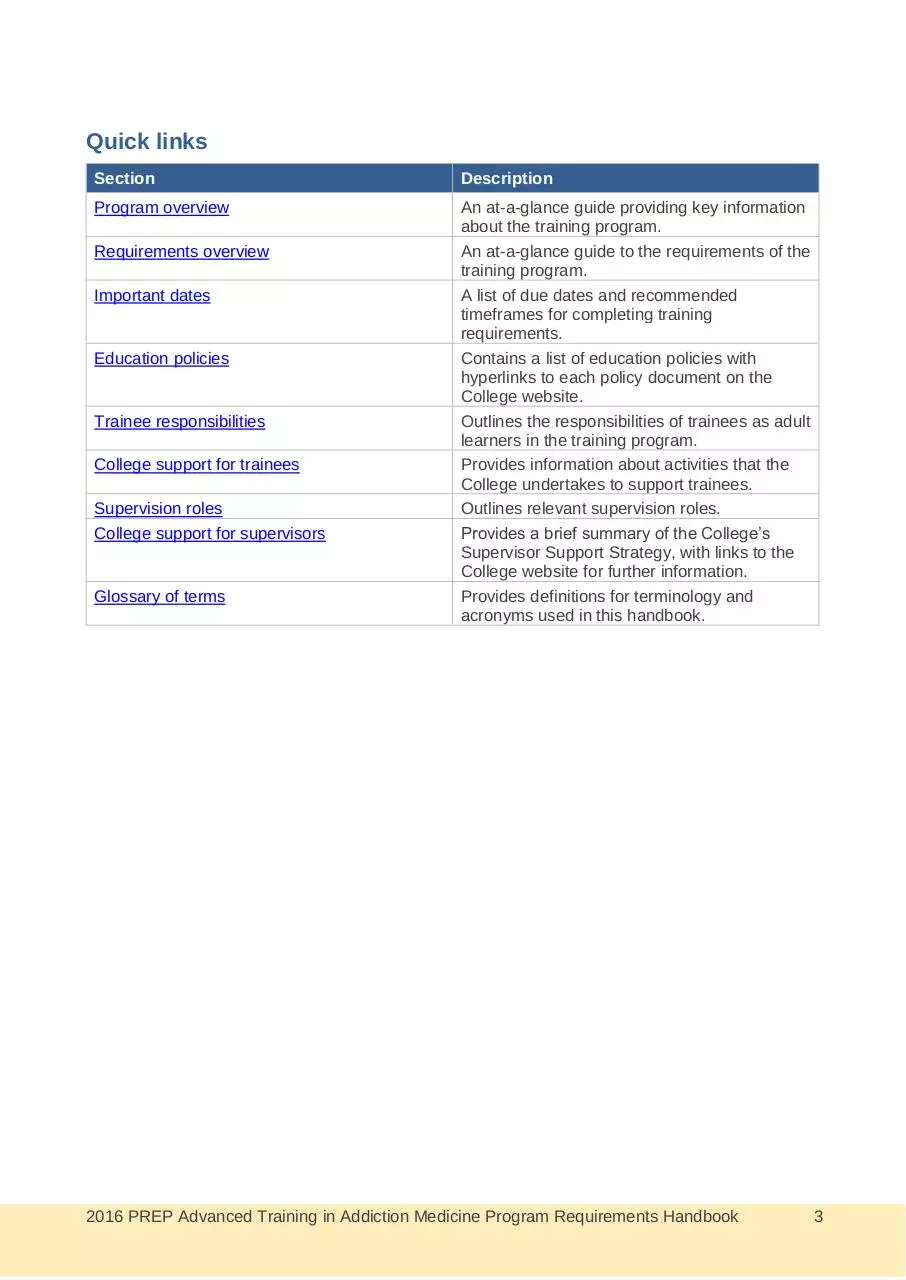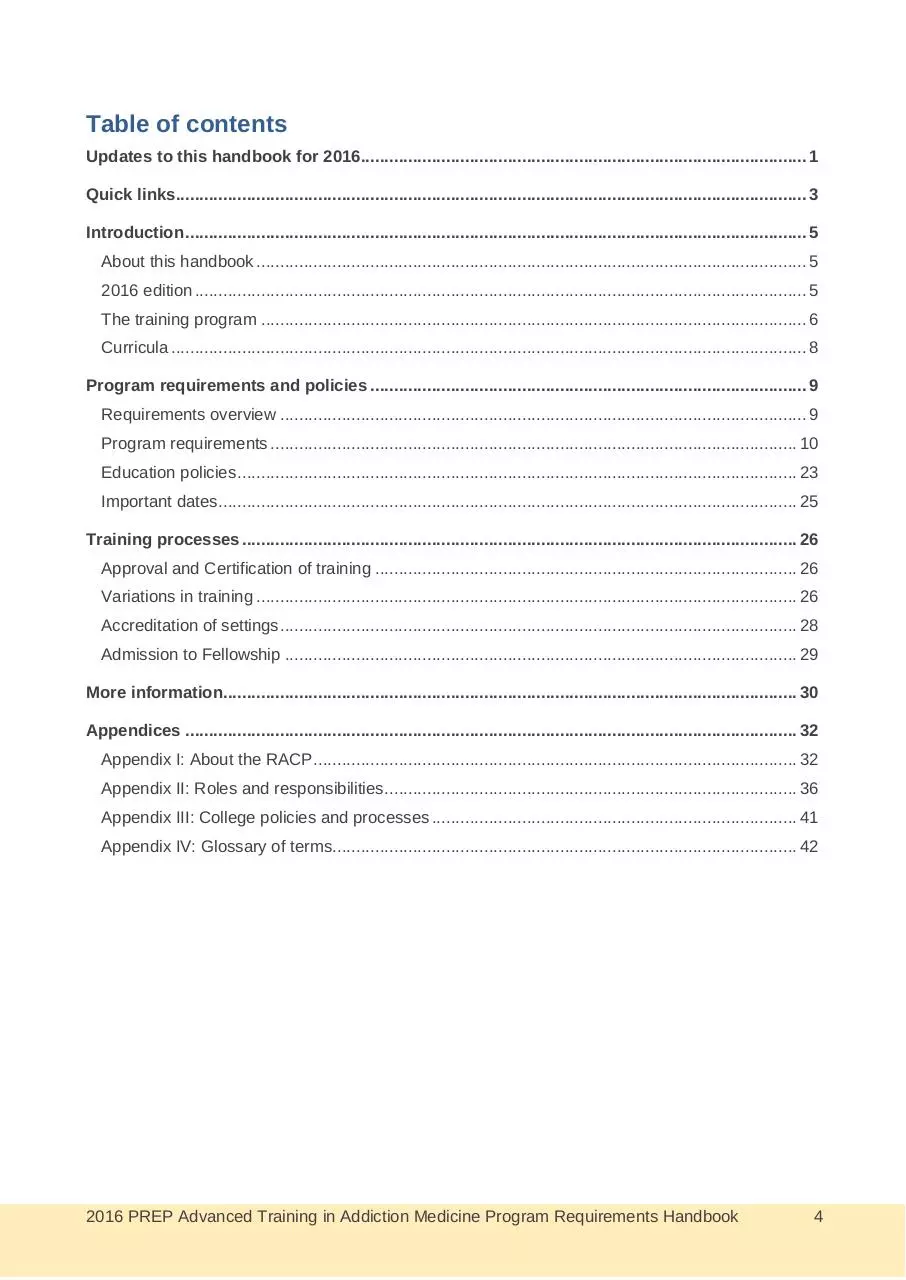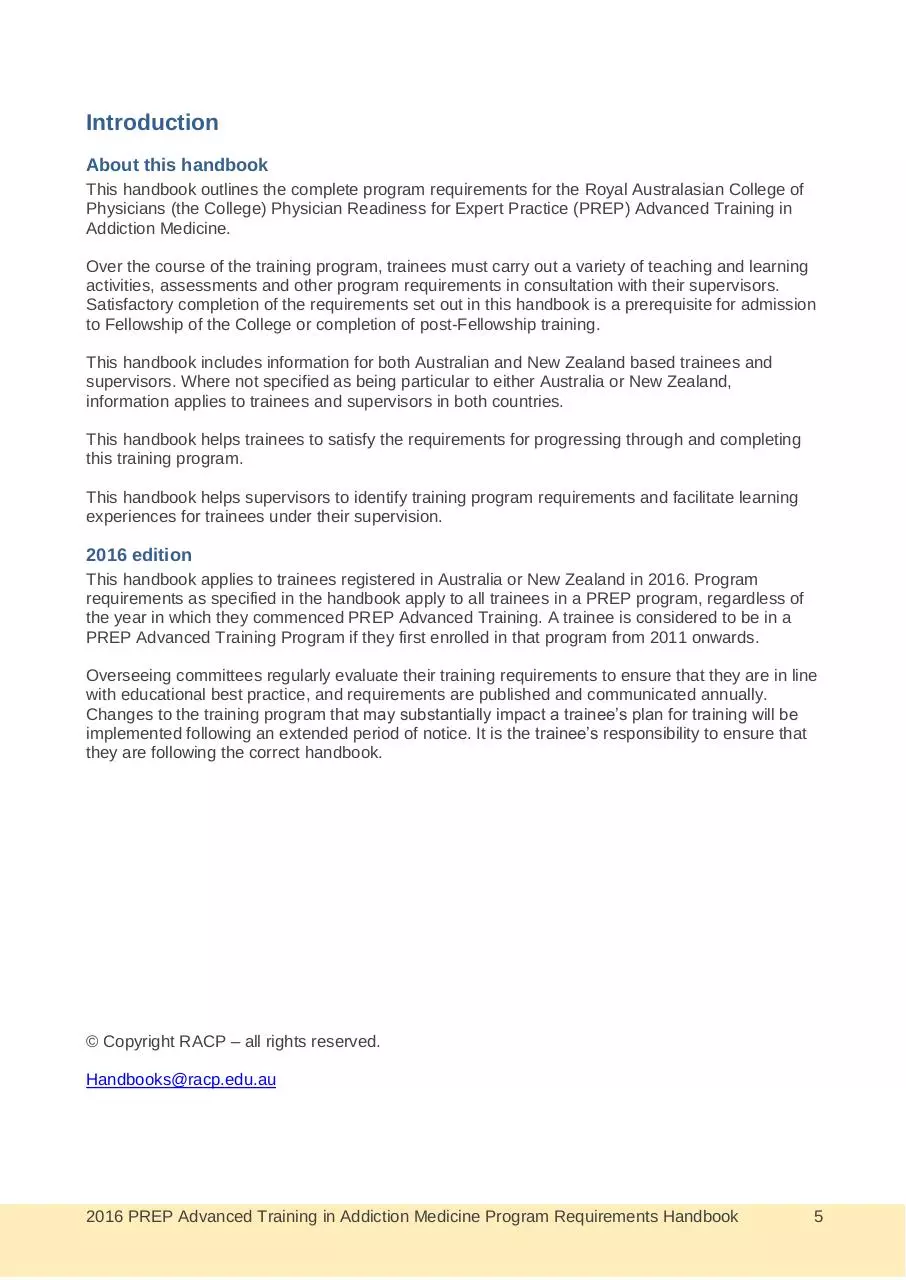Advanced Training in Addiction Medicine 2016 (Australasian) (PDF)
File information
Author: Katherine.Deller@racp.edu.au
This PDF 1.5 document has been generated by Microsoft® Word 2010, and has been sent on pdf-archive.com on 08/12/2017 at 07:57, from IP address 113.53.x.x.
The current document download page has been viewed 474 times.
File size: 908.15 KB (45 pages).
Privacy: public file





File preview
Physician Readiness for Expert Practice
Advanced Training in Addiction Medicine
2016 Program Requirements Handbook
Australasian Chapter of Addiction Medicine
Updates to this handbook for 2016
Changes to program requirements
Rationale for changes
FAChPM, FAChSHM, and FAFOEM
fellowships have been included as a
requirement for entry into training.
To extend entry to Fellows of these
chapters/faculties as a greater opportunity for
Fellows to diversify training.
For New Zealand and Australian trainees, the
Professional Qualities Reflection is a new
recommended requirement. It is recommended
to be completed by the end of the training year.
To introduce a specific professionalism
teaching and learning tool to facilitate reflection
and learning about professional areas of
practice.
Requirements for trainees with Certificate in
Addiction Psychiatry have changed. A scholarly
project will no longer be required in their third
year.
The RANZCP has changed their requirements
for the certificate to include a scholarly project.
As trainees who have completed the certificate
would have already completed a scholarly
project, they are no longer required to submit it
during their year of Advanced Training.
Changes to handbook content
Handbook content is revised every year. Sections of this handbook have been updated for ease of
access to information and reworded to clarify and enhance content for trainees and supervisors.
2016 PREP Advanced Training in Addiction Medicine Program Requirements Handbook
2
Quick links
Section
Description
Program overview
An at-a-glance guide providing key information
about the training program.
An at-a-glance guide to the requirements of the
training program.
A list of due dates and recommended
timeframes for completing training
requirements.
Contains a list of education policies with
hyperlinks to each policy document on the
College website.
Outlines the responsibilities of trainees as adult
learners in the training program.
Provides information about activities that the
College undertakes to support trainees.
Outlines relevant supervision roles.
Provides a brief summary of the College’s
Supervisor Support Strategy, with links to the
College website for further information.
Provides definitions for terminology and
acronyms used in this handbook.
Requirements overview
Important dates
Education policies
Trainee responsibilities
College support for trainees
Supervision roles
College support for supervisors
Glossary of terms
2016 PREP Advanced Training in Addiction Medicine Program Requirements Handbook
3
Table of contents
Updates to this handbook for 2016.............................................................................................. 1
Quick links..................................................................................................................................... 3
Introduction ................................................................................................................................... 5
About this handbook .................................................................................................................... 5
2016 edition ................................................................................................................................. 5
The training program ................................................................................................................... 6
Curricula ...................................................................................................................................... 8
Program requirements and policies ............................................................................................ 9
Requirements overview ............................................................................................................... 9
Program requirements ............................................................................................................... 10
Education policies ...................................................................................................................... 23
Important dates .......................................................................................................................... 25
Training processes ..................................................................................................................... 26
Approval and Certification of training ......................................................................................... 26
Variations in training .................................................................................................................. 26
Accreditation of settings ............................................................................................................. 28
Admission to Fellowship ............................................................................................................ 29
More information......................................................................................................................... 30
Appendices ................................................................................................................................. 32
Appendix I: About the RACP ...................................................................................................... 32
Appendix II: Roles and responsibilities ....................................................................................... 36
Appendix III: College policies and processes ............................................................................. 41
Appendix IV: Glossary of terms.................................................................................................. 42
2016 PREP Advanced Training in Addiction Medicine Program Requirements Handbook
4
Introduction
About this handbook
This handbook outlines the complete program requirements for the Royal Australasian College of
Physicians (the College) Physician Readiness for Expert Practice (PREP) Advanced Training in
Addiction Medicine.
Over the course of the training program, trainees must carry out a variety of teaching and learning
activities, assessments and other program requirements in consultation with their supervisors.
Satisfactory completion of the requirements set out in this handbook is a prerequisite for admission
to Fellowship of the College or completion of post-Fellowship training.
This handbook includes information for both Australian and New Zealand based trainees and
supervisors. Where not specified as being particular to either Australia or New Zealand,
information applies to trainees and supervisors in both countries.
This handbook helps trainees to satisfy the requirements for progressing through and completing
this training program.
This handbook helps supervisors to identify training program requirements and facilitate learning
experiences for trainees under their supervision.
2016 edition
This handbook applies to trainees registered in Australia or New Zealand in 2016. Program
requirements as specified in the handbook apply to all trainees in a PREP program, regardless of
the year in which they commenced PREP Advanced Training. A trainee is considered to be in a
PREP Advanced Training Program if they first enrolled in that program from 2011 onwards.
Overseeing committees regularly evaluate their training requirements to ensure that they are in line
with educational best practice, and requirements are published and communicated annually.
Changes to the training program that may substantially impact a trainee’s plan for training will be
implemented following an extended period of notice. It is the trainee’s responsibility to ensure that
they are following the correct handbook.
© Copyright RACP – all rights reserved.
Handbooks@racp.edu.au
2016 PREP Advanced Training in Addiction Medicine Program Requirements Handbook
5
The training program
Advanced Training:
provides a ‘depth’ of training in a specialty field under supervision
builds on the skills developed in preceding training while increasing in complexity,
sophistication and responsibility
prepares trainees for independent practice as consultants.
Program overview
Table 1 – Overview of Advanced Training in Addiction Medicine
Program
Advanced Training in Addiction Medicine
Overseeing committee
Training Committee in Addiction Medicine
Entry requirements
In order to be accepted into Advanced Training in Addiction
Medicine, an applicant must be a registered medical practitioner in
Australia or New Zealand. Documentation from the relevant
Medical Board/Council should be provided by the applicant at the
time of initial application.
Entry to Advanced Training in Addiction Medicine can be gained
through:
Fellowship of one of the following Colleges, Divisions or
Faculties:
o Anaesthetists (FANZCA)
o Emergency Medicine (FACEM)
o General Practice (FRACGP and FRNZCGP)
o Adult Medicine Division (FRACP)
o Paediatrics & Child Health Division (FRACP)
o Pain Medicine (FFPMANZCA)
o Psychiatry (FRANZCP)
o Public Health Medicine (FAFPHM)
o Rehabilitation Medicine (FAFRM)
o Rural and Remote Medicine (FACRRM)
o Palliative Medicine (FAChPM)
o Sexual Health Medicine (FAChSHM)
o Occupational and Environmental Medicine (FAFOEM)
or
Completion of RACP Basic Training and success in the Written
and Clinical Examinations.
and
Appointment to an appropriate Advanced Training position
Minimum duration
3 years (full-time equivalent (FTE))
Curricula
Addiction Medicine Advanced Training Curriculum
Professional Qualities Curriculum
Qualification
Fellowship of the Australasian Chapter of Addiction Medicine
(FAChAM)
2016 PREP Advanced Training in Addiction Medicine Program Requirements Handbook
6
Entering the program
Trainees may commence the Advanced Training Program after obtaining Fellowship of one of the
above Colleges, Divisions or Faculties, or following satisfactory completion of Basic Training
requirements (including success in the Divisional Written and Clinical Examinations) and
appointment to an appropriate Advanced Training position.
Candidates must secure an Advanced Training position at a suitable training site. Core training
usually needs to be undertaken at training sites accredited by the College for Advanced Training in
the relevant specialty. For further information about the accreditation of training settings, please
refer to the Accreditation of settings section of this handbook.
Some specialty groups conduct coordinated selection processes for appointing trainees to training
positions. Details of participating states, regions and specialties are available on the College
website from June each year.
Please note that the College is not responsible for trainee recruitment and has no role in the
recruitment process.
Once trainees have secured a training position, they must apply for the approval of their training in
accordance with the due dates detailed in Table 2. Applications can be made online via the
College website. Trainees must organise the timely submission of all necessary documentation
and keep a copy of the application for future reference.
Table 2 – Closing dates for applications
15 February
31 August
Closing date for applications for prospective approval of rotations in the
current year
Closing date for applications for prospective approval of rotations in the
second half of the current year
Re-registration
Throughout training trainees must continue to maintain registration with the College. All training
periods must be applied for prospectively and approved, as set out in the Progression through
Training policy.
Training fees
Information about current training fees and terms and conditions is available on the College
website.
2016 PREP Advanced Training in Addiction Medicine Program Requirements Handbook
7
Curricula
RACP curriculum standards outline the learning objectives and associated knowledge, skills,
attitudes and behaviours required of graduates of College training programs.
The program-specific curriculum standards are to be used in conjunction with the Professional
Qualities Curriculum, which outlines the range of non-clinical/non-program-specific knowledge,
skills, attitudes and behaviours required of, and commonly used by, all physicians regardless of
specialty or area of expertise.
The program-specific and Professional Qualities curricula can be found on the College website.
The curricula enable trainees to:
clarify expectations of their training outcomes, by clearly identifying the knowledge, skills and
experiences they should acquire during training
assess their progress, set their learning goals and evaluate the suitability of their training
experiences
demonstrate the knowledge and skills they have acquired during a training term
identify the areas of knowledge and skill that require further development.
Reading the curricula will help trainees to gauge what skills and attributes are required in their
chosen specialty. It may also help guide their future learning in terms of the experiences and jobs
they will need to plan for in order to meet the training requirements.
2016 PREP Advanced Training in Addiction Medicine Program Requirements Handbook
8
Program requirements and policies
Requirements overview
Core training
(minimum 18 months)
Non-core training
(maximum 18 months)
Content
Addiction Medicine Advanced Training
Addiction Medicine Advanced Training
Curriculum
Curriculum
Professional Qualities Curriculum
Professional Qualities Curriculum
Supervision
Per year:
Per year:
1 supervisor with FAChAM (required)
1 supervisor with FAChAM (required)
A second supervisor who may or may
A second supervisor who may or may
not have FAChAM (recommended)
not have FAChAM (recommended)
Teaching and learning requirements
Per year:
2 Learning Needs Analysis
1 Professional Qualities Reflection
(recommended)
Logbook
Per year:
2 Case-based Discussions
2 Final Supervisor’s Reports
Per year:
2 Learning Needs Analysis
1 Professional Qualities Reflection
(recommended)
Logbook
Assessment
Per year:
2 Case-based Discussions
2 Final Supervisor’s Reports
By the end of Advanced Training:
36 months of certified training time consisting of:
Minimum of 18 months core training
Maximum of 18 months non-core training
2 projects:
o 1 research project
o 1 public health workbook
2 Observed Patient Interviews
1 Case History
Completion of addiction medicine online modules (recommended)
2016 PREP Advanced Training in Addiction Medicine Program Requirements Handbook
9
Download Advanced Training in Addiction Medicine 2016 (Australasian)
Advanced Training in Addiction Medicine 2016 (Australasian).pdf (PDF, 908.15 KB)
Download PDF
Share this file on social networks
Link to this page
Permanent link
Use the permanent link to the download page to share your document on Facebook, Twitter, LinkedIn, or directly with a contact by e-Mail, Messenger, Whatsapp, Line..
Short link
Use the short link to share your document on Twitter or by text message (SMS)
HTML Code
Copy the following HTML code to share your document on a Website or Blog
QR Code to this page

This file has been shared publicly by a user of PDF Archive.
Document ID: 0000706124.